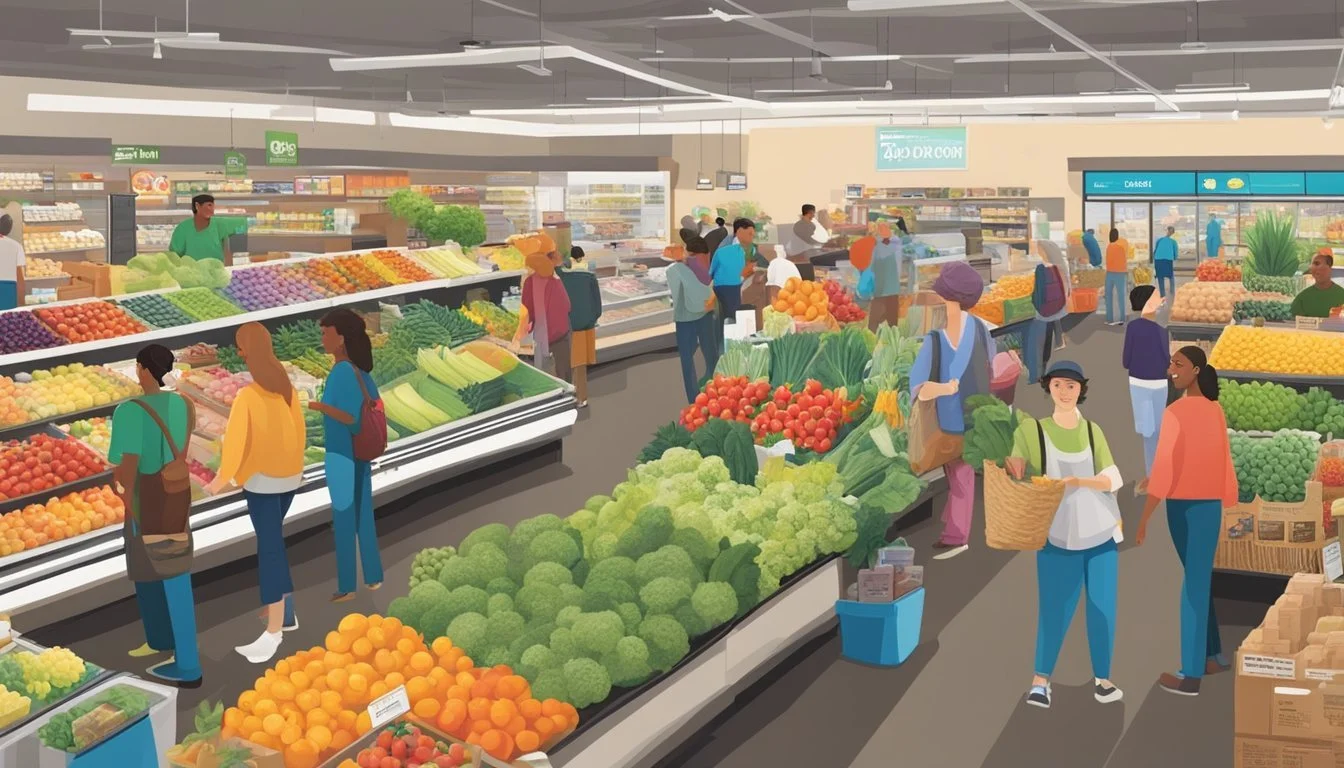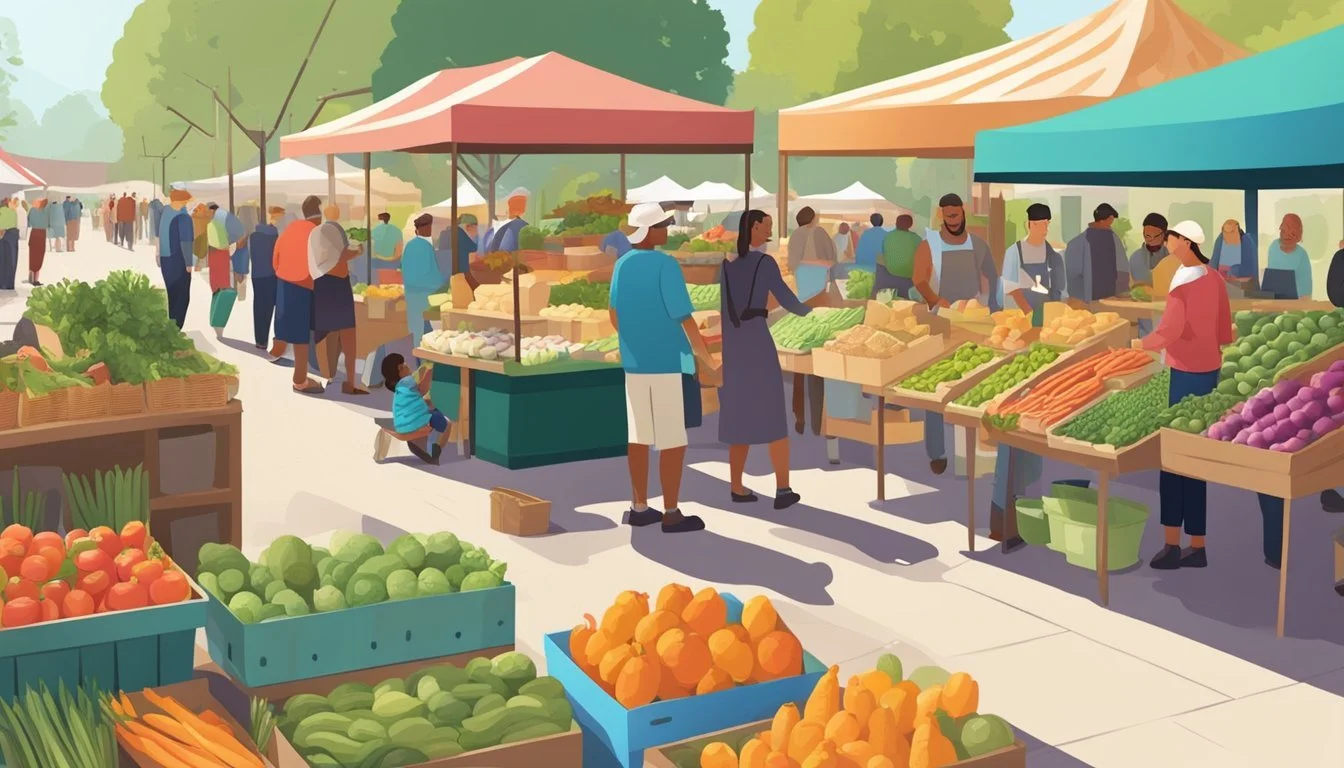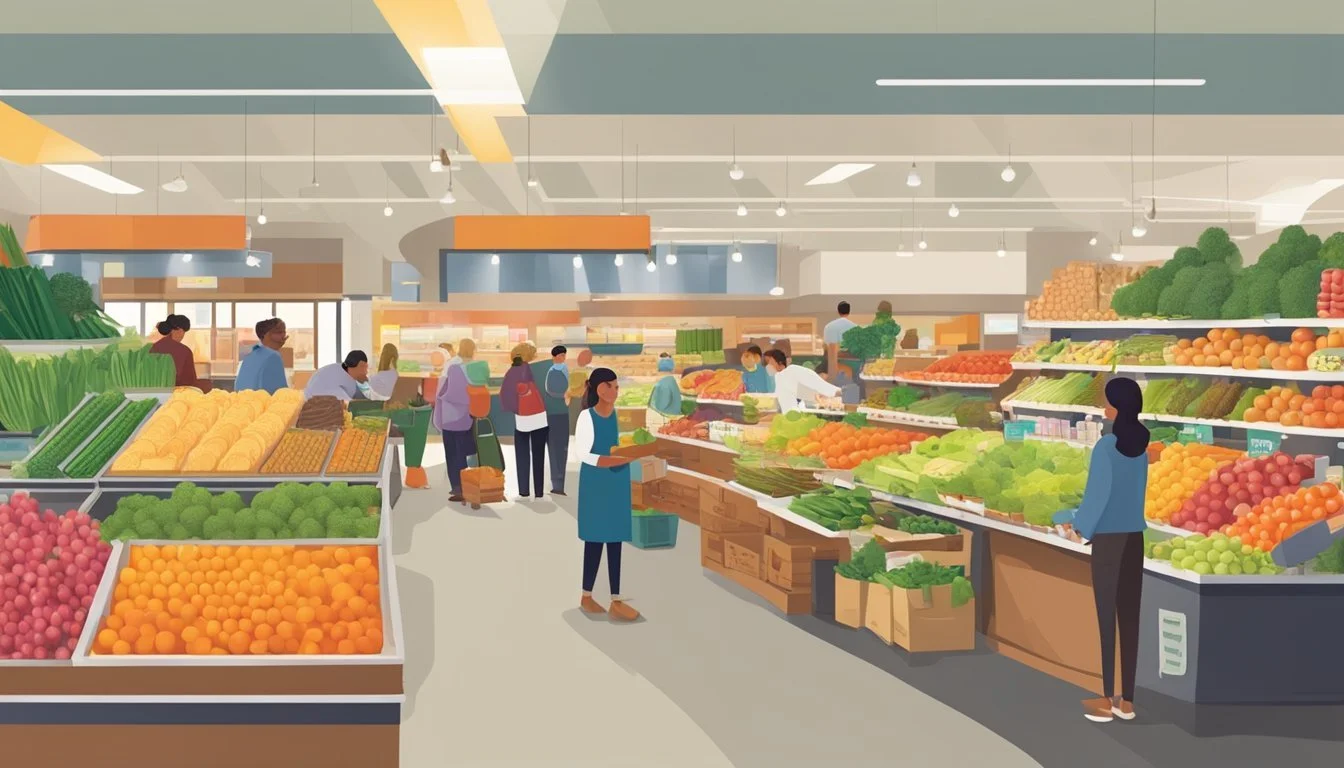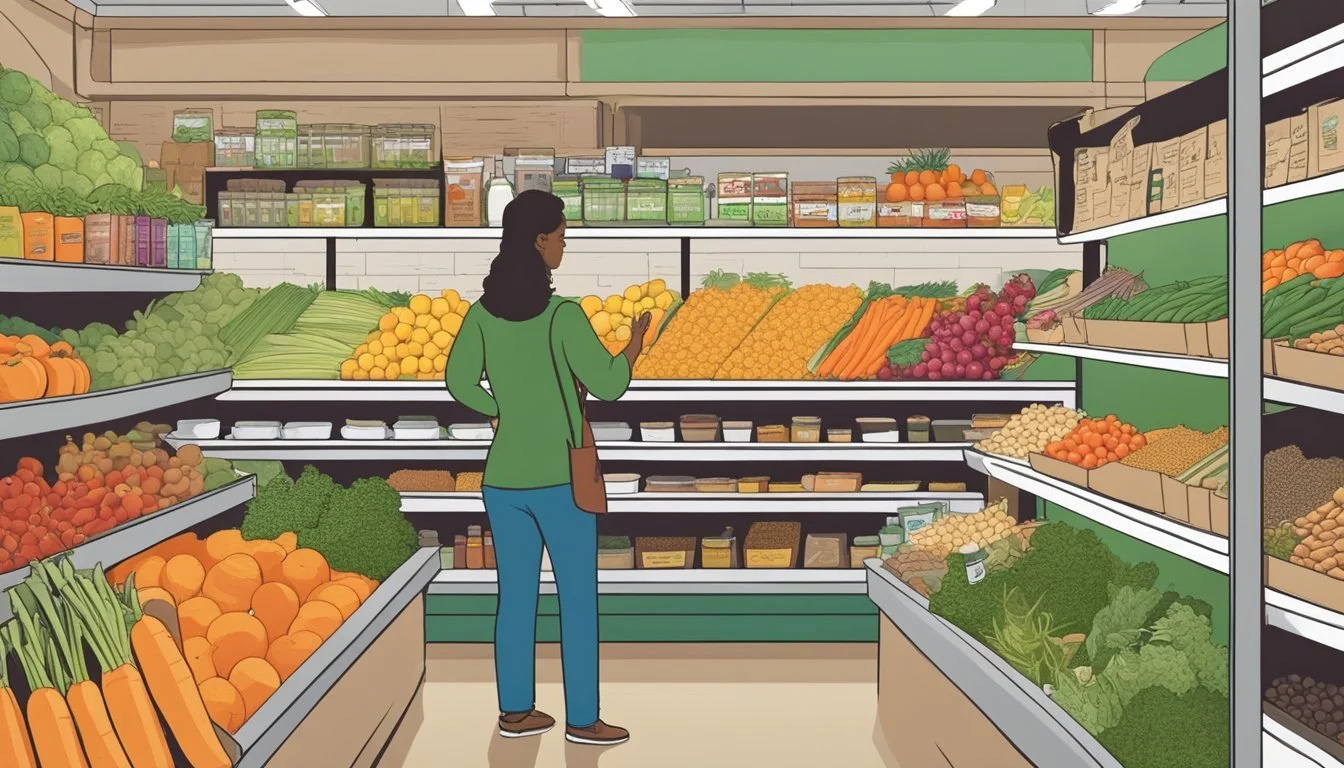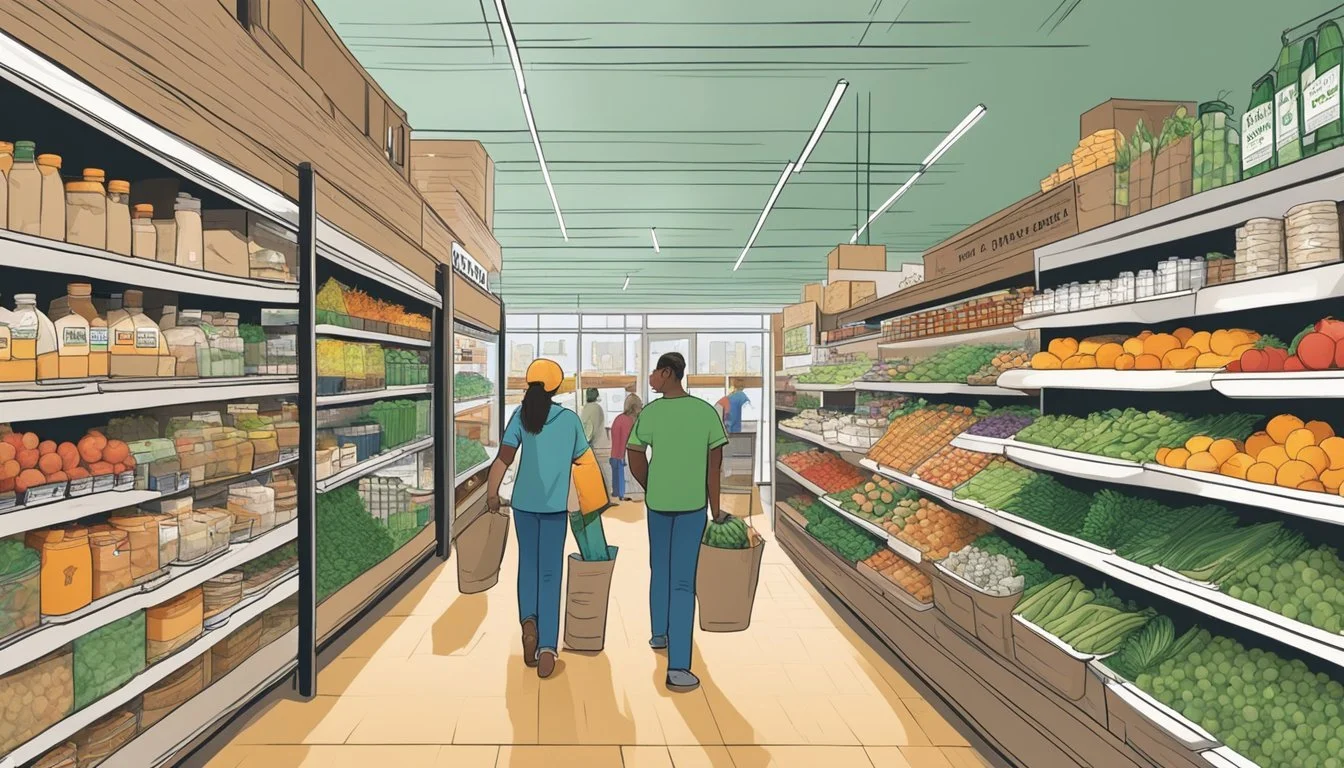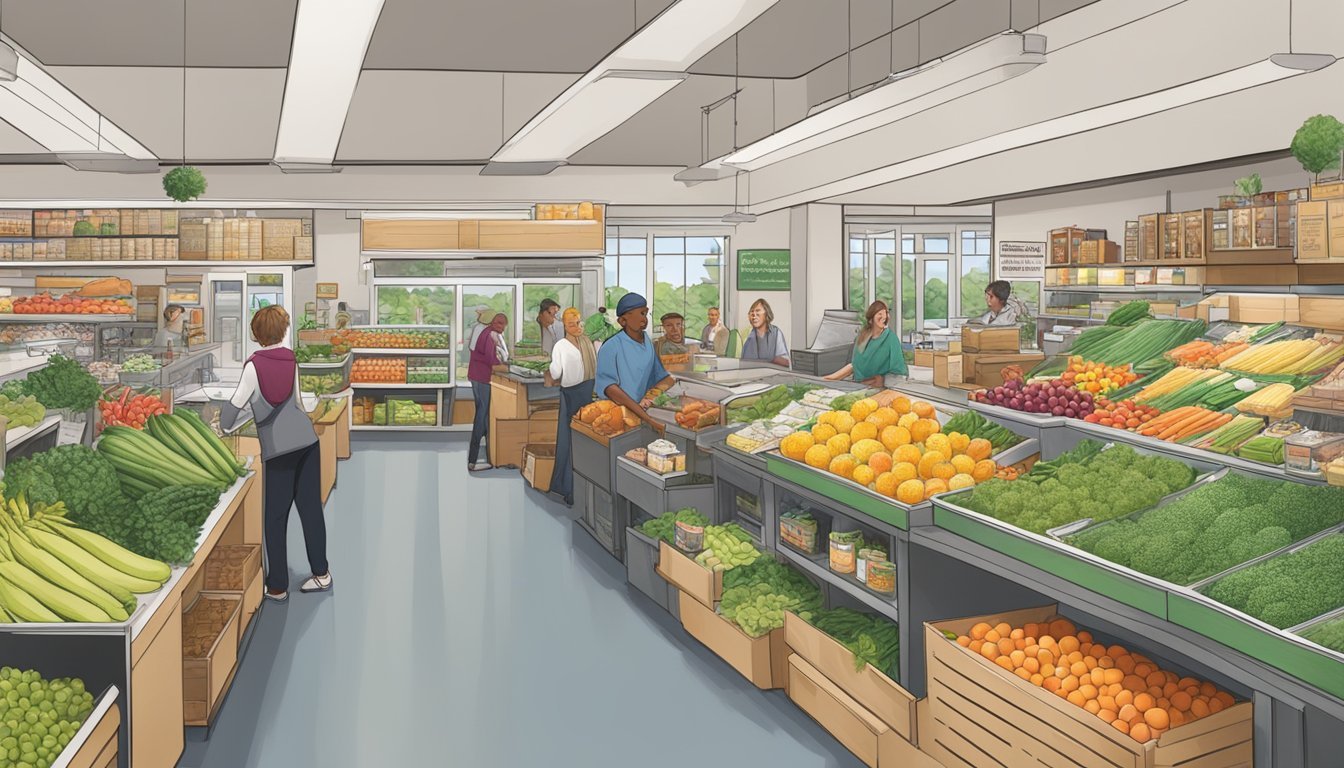Guide to Food Co-Ops in Durham, NC
Your Essential Resource
Food cooperatives, also known as co-ops, offer an alternative to traditional grocery stores by operating on a model that prioritizes community benefit over profits. In Durham, North Carolina, these community-oriented establishments have taken root, providing residents with local, sustainably-sourced food and an opportunity to invest in their local economy. Unlike conventional grocery stores, co-ops are owned and governed by their members, who often have a say in the business decisions, reflecting the community's needs and values.
Durham's food co-ops, such as the Durham Co-op Market, emphasize local produce, fostering close ties with area farmers and artisans. This not only supports the regional agricultural community but also reduces the environmental impact of long-distance food transport. The co-op's focus on community extends beyond simply selling groceries; they serve as social and educational hubs, hosting events like Thirsty Thursdays for members to enjoy free samples and engage with one another.
By choosing to shop at a co-op, residents of Durham can enjoy fresh and wholesome foods while contributing to a more equitable food system. These markets stand as testaments to the power of collective action and the shared belief in a more sustainable and inclusive approach to grocery shopping within the community.
History of Food Co-Ops in Durham
Durham has a rich legacy in the food co-op movement, marked by community-driven initiatives aimed at providing access to natural and organic foods.
Origins of Durham Co-Ops
In the 1970s, driven by a demand for natural and organic food options, the first Durham Food Co-op opened its doors. Over time, it occupied multiple locations, with one notable site on West Chapel Hill St., which is currently the location of The Cookery. These early co-ops not only provided access to healthier food options but also became a cornerstone for community engagement and local commerce.
Key Milestones
1971: The Durham Food Co-op, initially named the Intergalactic Food Conspiracy, began operation just a block away from the current Durham Co-op Market location.
2009: The legacy food cooperative ceased operations, having influenced the local food landscape for nearly four decades.
Present: The Durham Co-op Market serves the community at 1111 W Chapel Hill St, sustaining the mission to offer fresh, local, and organic foods.
Understanding Food Co-Ops
In Durham, North Carolina, food co-ops operate as community-centered supermarkets where the focus extends beyond commerce to embody core community values and cooperative principles.
What is a Co-Op?
A co-op, or cooperative, is a business that's owned and operated by its members, who make decisions democratically. In the context of Durham, food co-ops are retail outlets where products are carefully selected based on a commitment to local sourcing and organic options. These establishments are community-owned, meaning that customers often have the opportunity to become member-owners. As member-owners, they gain the ability to influence the products stocked and the overall direction of the store.
Key Characteristics:
Democratic Member Control: Decisions are made by a vote of the membership.
Operation for Community Benefit: Profits are used to serve the interests of the members and the surrounding community.
Cooperative Principles
Cooperative businesses are driven by universally accepted principles that prioritize human needs over profit. The cooperative principles that guide food co-ops in Durham include:
Voluntary and Open Membership: They are open to all individuals willing to accept the responsibilities of membership without gender, social, racial, political, or religious discrimination.
Member Economic Participation: Members contribute equitably to, and democratically control, the capital of the cooperative.
Autonomy and Independence: Co-ops are self-help organizations controlled by their members. If they enter into agreements with other organizations or raise capital from external sources, it is done so based on terms that ensure democratic control by the members and maintain the cooperative's autonomy.
Education, Training, and Information: Co-ops provide education and training for members, elected representatives, managers, and employees so that they can contribute effectively to the development of their co-operatives. They inform the general public about the nature and benefits of cooperatives.
Cooperation among Cooperatives: Co-ops serve their members most effectively and strengthen the cooperative movement by working together through local, national, regional, and international structures.
These principles are not just guidelines but are actively integrated into the day-to-day operations and long-term strategies of the cooperative, ensuring that the business always reflects the core values it was founded upon.
The Durham Co-Op Market
The Durham Co-Op Market stands as a community-centered grocery store that prioritizes local products and cooperative ownership. Situated in Durham, North Carolina, it not only supports local suppliers but also allows members to become co-owners with a voice in the business.
About Durham Co-Op Market
Durham Co-Op Market offers a wide array of goods ranging from high-quality household essentials to locally sourced food items. Open since 2015, the market is located at 1111 W Chapel Hill St, Durham, NC 27701, which is easily accessible for the residents of Durham. A key aspect of the market is its dedication to supporting local producers and artisans, ensuring that the products on the shelves contribute to the local economy. The store's atmosphere is imbued with a sense of community, targeting not only to provide grocery essentials but also to serve as a focal point where local people can gather and share in the co-op experience.
Membership and Ownership
The cooperative model of Durham Co-Op Market allows for individual customers to become members, granting them ownership stakes in the business. Membership entails numerous benefits and privileges, including the ability to:
Vote on important decisions that affect the store's operation and direction.
Participate in community initiatives and partnerships.
By becoming an owner, members contribute to a democratic process that shapes the future of the market. Moreover, the Durham Co-Op Market's partnerships reflect its commitment to social responsibility and community development. Through these connections and the active participation of its owners, the market fosters a localized food system and a thriving cooperative business model.
Local Impact of Co-Ops
Food co-ops in Durham, NC, notably influence the local community by bolstering the economy through support of local vendors and farms, and by advancing environmental sustainability.
Supporting Local Economy
Food co-ops are a boon to the local economy. They create jobs and invest in the community by sourcing from local farms and producers. For instance, on average, member food co-ops affiliated with National Co+op Grocers are reported to purchase from as many as 281 local entities. These co-ops are also active in fostering positive relationships with local vendors, ensuring that dollars spent at the co-ops circulate within the community, thereby strengthening the local economy.
Environmental Sustainability
Food co-ops also lead the way in environmental sustainability. They often prioritize organic and sustainable products, reducing the carbon footprint associated with long-distance food transportation. Moreover, many co-ops integrate environmentally regenerative practices into their operations to minimize waste and promote recycling and composting. This not only aids in protecting the local environment but also educates the community on the importance of sustainability.
Services and Products Offered
Durham, NC, boasts a wealth of food co-ops that pride themselves on providing a diverse array of groceries and specialty products. These community-oriented stores focus on high-quality, healthful choices that support local producers and cater to the conscious consumer.
Grocery Selection
The co-ops in Durham offer a broad selection of grocery items that cater to various dietary preferences and needs. Customers can expect to find:
Fresh, locally-sourced produce
A wide range of natural and organic food items
Pasture-raised meats with a clear traceability to ethical sources
Daily essentials and household items that complement a sustainable lifestyle
The commitment to local sourcing is evident in their support for small-scale farmers and producers, ensuring that the majority of items available are fresh and contribute to the local economy.
Specialty Foods and Wellness
Specialty foods and wellness products receive special attention at Durham’s co-ops. Shoppers can explore an impressive variety of:
Craft beer and fine wine, often highlighting local breweries and vineyards
An apothecary section with a selection of natural wellness products
Gourmet cheeses, international condiments, and artisanal foodstuffs
These stores are not only food destinations but also serve as gateways to unique and premium-quality items that are ethically produced and often hard to find elsewhere.
Inclusivity and Accessibility
Durham's food co-ops actively strive to create a welcoming atmosphere for all members of the community, while ensuring their spaces and services are accessible to everyone, including those with disabilities.
Creating an Inclusive Space
The Durham Co-op Market positions itself as a diverse store catering to a wide demographic. With initiatives aimed at offering equal access to fresh foods such as the Durham Community Fridges, which operates a free fridge mutual aid project, they exemplify a commitment to inclusivity. Additionally, they partner with organizations like Grow to Life, a Black-led group focused on food and nutrition justice, to address the needs of marginalized communities.
Accessibility for All
Accessibility is a key priority for Durham's community-owned grocer. The co-op offers grants through collaborations with organizations like Weaver Street Market to support local food access nonprofits and community projects, demonstrating their dedication to making healthy food available to all. They also maintain transparency in operational practices, staying attuned to the importance of food access in historically redlined neighborhoods, thereby reinforcing the idea of a co-op that serves as a cornerstone for community sustenance and support. The Durham Co-op Market's premise at 1111 W Chapel Hill St provides physical accessibility to shoppers of all abilities, with attention to navigable store layouts and assistance services.
Community Programs
Food co-ops in Durham, NC, are more than just shopping destinations; they serve as pivotal community hubs for education and collaboration. They provide a variety of programs designed to enrich the local community, offer opportunities for learning, and support neighbors helping neighbors.
Educational Workshops
Food co-ops frequently conduct educational workshops that aim to enhance the nutritional knowledge and food-preparation skills of their customers. These workshops range from simple cooking classes to more in-depth sessions about diet, health, and sustainability. Whether someone is a seasoned home cook or a beginner interested in healthier eating habits, these workshops provide valuable opportunities for community members to learn and grow together.
Events and Partnerships
Building strong events and partnerships has enabled food co-ops in Durham to foster an environment where neighbors become friends. They host events that bring people together, often in partnership with local non-profits and community-based initiatives. By supporting local food access through grants and events, the co-ops strengthen their ties with the community and elevate the collective mission of inclusive, sustainable food systems.
Collaborative Events: Seasonal celebrations, local product showcases, and community meetings.
Support for Nonprofits: Grants and mutual aid projects like community fridges support the wider network of food access and security.
Economic Practices and Success
In Durham, NC, food co-ops embody resilience and a commitment to the community through their economic practices. They not only prioritize accessibility and quality but also ensure their business models contribute to sustainable growth and measurable success.
Sustainable Business Practices
Durham food co-ops operate on the principle that businesses should offer both affordability and high-quality ingredients. For instance, Durham Co-op Market maintains a roster of products that includes pasture-raised meats and specialty foods, balancing consumer demand with ethically sourced items. They utilize a business model that reinvests profits into the co-op, strengthening their ties with local suppliers and supporting sustainable agricultural practices.
Inventory Management: Selecting products that meet stringent standards for sustainability and ethical production.
Supplier Relationships: Building long-term partnerships with local producers to ensure a supply chain that aligns with cooperative values.
Pricing: Implementing a pricing strategy that makes high-quality, locally-sourced groceries more affordable to their member-owners and the community.
Measuring Success
Success for food co-ops in Durham is not solely defined by sales figures but also by the impact they have on their local economy and society. The Durham Co-op Market, celebrating its landmark years in operation, proves its success through its continued service to the Durham community. Key indicators include:
Sales Growth: Tracking sales as a direct measure of their capacity to meet consumer needs and preferences.
Community Impact: Assessing the effect on local economic development and social justice, underlined by the co-op's support for communal endeavors.
Member Satisfaction: Gauging the contentment of co-op members, who have a vested interest in the financial and ethical performance of the store.
By upholding these business practices and success metrics, Durham food co-ops demonstrate that a business can effectively combine profit with purpose.
Staff and Employment
Durham's food co-ops dedicate themselves to creating a positive workplace culture, ensuring staff members work in an environment where respect, dignity, and fair compensation are central tenets.
Working at a Co-Op
Employees at Durham food co-ops such as the Durham Co-op Market have opportunities to work in various roles, ranging from produce management to specialized segments like cheese and specialty products. The working environment is tailored to be community-focused, serving not only the customers but also the staff members who are an integral part of the co-op's success. Staff members like Josh Collier have progressed from roles such as Specialty Coordinator to becoming the Prepared Foods Manager, demonstrating the potential for career growth within the co-op structure.
Role Responsibilities Progress Opportunities Produce Manager Managing produce section Advancement to senior management roles Specialty Coordinator Handling specialty items Move into management roles like Prepared Foods Manager
Employee Well-Being
Durham food co-ops are known for their commitment to a healthy workplace that promotes mutual respect and inclusiveness. The Durham Co-op Market exemplifies this through their focus on creating a strong, safe, and supportive work environment. They prioritize high ethical standards and sound management, fostering a workplace where every staff member's dignity is upheld and their contributions are valued. Fair compensation is also a key focus, ensuring that all employees are paid in line with their experience and the quality of work that they deliver.
Respect and Inclusiveness: Co-ops strive to maintain an environment where every employee feels valued and supported.
Dignity and Ethical Standards: Employees are treated with dignity, and ethical practices are the foundation of the workplace culture.
Fair Compensation: Salaries are commensurate with roles and responsibilities, reflecting the co-op's commitment to fairness.
Future of Food Co-Ops in Durham
Durham's food co-operatives are poised for innovative growth and greater community engagement. They offer a future where the Durham community can access sustainable, locally-sourced food while fostering economic opportunities.
Emerging Opportunities
The Durham Co-op Market's affiliation with the National Cooperative Grocers Association is an indicator of an impending expansion in the network and influence of local co-ops. These relationships present numerous opportunities for shared resources, knowledge exchange, and centralized marketing efforts that could bolster the position of food co-ops in the local food economy.
New technology adoption and the integration of regenerative agricultural practices are further propelling Durham’s food co-ops into the forefront of sustainable development. Market trends suggest a rising consumer interest in organics and eco-friendly practices, which food co-ops are well-positioned to capitalize on.
Community Vision and Growth
Food co-ops in Durham have been steadily reinforcing their roots in the local community. With a vision geared towards inclusivity and collective growth, food co-ops are expanding their reach. This is reflected in initiatives like "Thirsty Thursdays" and "Round Up for Food For All" at the Durham Co-op Market, which serve not only to bring community members together but also support local causes.
The growth of Durham’s food co-ops is expected to reflect the community's values of social responsibility and economic participation. These establishments serve as hubs for local economic stimulation and reflect the community's commitment to food security and sustainability. As Durham continues to grow, so too does the potential for its co-ops to serve as models of community-driven food systems.
Getting Involved
Participation in Durham’s food co-ops provides a unique opportunity to support local agriculture and gain access to high-quality household essentials. One can get involved through active participation or by going through a structured application process. Each method is an opportunity to contribute to the cooperative's success and engage with the community.
How to Participate
Individuals looking to be part of a food co-op in Durham, NC, have various methods of participation available. They might volunteer their time, attend community events, or become a member by purchasing a share of the cooperative. This investment not only offers the chance to influence the co-op's operations but also sometimes grants access to special member-only discounts and events.
Volunteering: Offer time and skills to the co-op's various needs.
Events: Participate in co-op-organized gatherings to engage and learn.
Membership: Purchase a share and gain voting rights and potential discounts.
The Application Process
Joining a co-op typically involves an application process where interested parties submit necessary information to be considered for membership. The process varies by co-op but generally includes providing contact details, indicating the level of desired involvement, and agreeing to the co-op's principles.
Contact Information: Provide full name, address, and contact details.
Involvement Level: Specify the capacity in which one wishes to be involved, be it as a member, volunteer, or participant in Opportunity Threads.
Agreement: Acknowledge and accept the cooperative's guiding principles and terms of involvement.
The application process is integral to ensuring a commitment to the values and sustainability of the cooperative model, offering all members a stake in both operations and outcomes.

